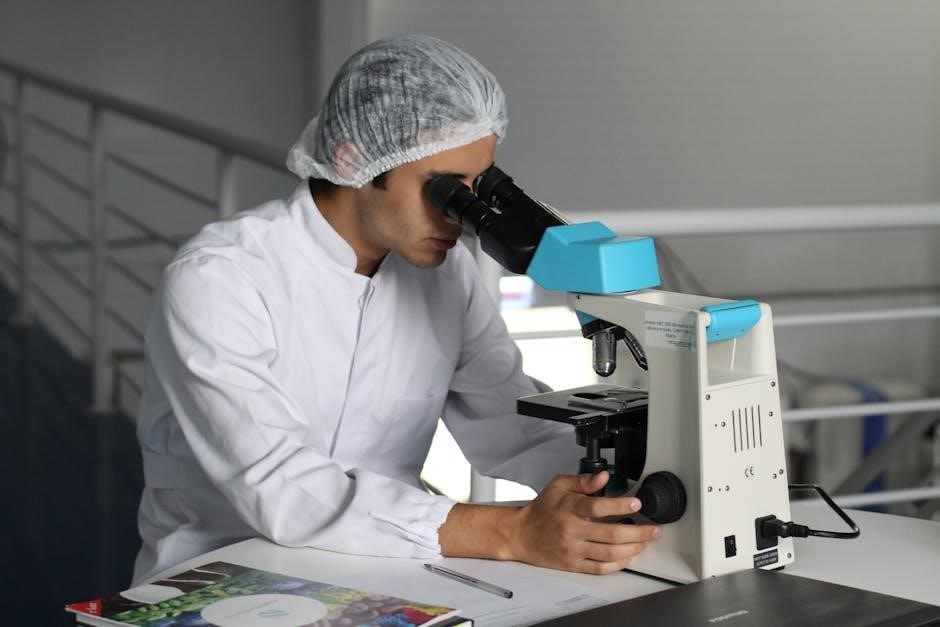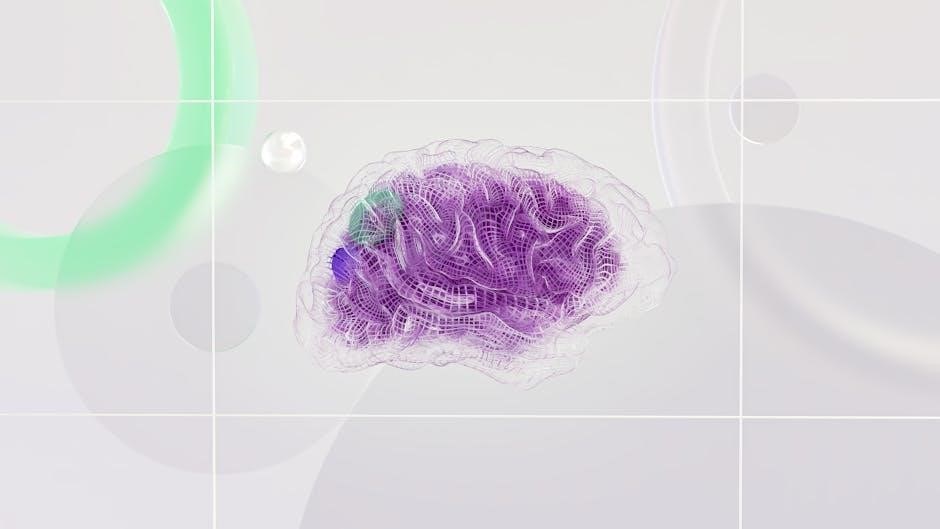
examen de science secondaire 3 pdf
Overview of the Science Exam for Secondary 3
The Secondary 3 Science exam is a comprehensive assessment evaluating students’ understanding of key scientific concepts and their ability to apply critical thinking skills effectively.
1.1 Importance of the Exam in the Secondary Curriculum
The Secondary 3 Science exam plays a crucial role in assessing students’ foundational knowledge and skills, ensuring readiness for higher-level studies. It evaluates understanding of core concepts, fostering critical thinking and problem-solving abilities. The exam also serves as a benchmark for future academic and career pathways, emphasizing the significance of scientific literacy in a rapidly evolving world.
1.2 Key Topics Covered in the Exam
The Secondary 3 Science exam covers essential topics such as the digestive and respiratory systems, nutrition, and the circulatory system. It also includes sections on technology, scientific methods, and environmental studies. Students are assessed on their understanding of biological processes, scientific inquiry, and the application of concepts to real-world scenarios, ensuring a well-rounded evaluation of their scientific knowledge and skills.

Exam Structure and Format
The exam consists of multiple-choice and open-ended questions, covering biology, chemistry, and physics. It includes theoretical and practical sections, with a time limit of 120 minutes, assessing critical thinking and problem-solving skills effectively.
2.1 Content Areas and Weightage
The Secondary 3 Science exam covers biology, chemistry, and physics, with a focus on key concepts like cells, motion, and chemical reactions. Biology accounts for 40%, chemistry 30%, and physics 30%, reflecting their importance in the curriculum. The exam assesses both theoretical knowledge and practical applications, ensuring a balanced evaluation of students’ understanding and problem-solving abilities across all scientific disciplines.
2.2 Types of Questions and Assessment Criteria
The exam features multiple-choice questions, short-answer sections, and problem-solving tasks to evaluate conceptual understanding and practical application. Assessment criteria focus on accuracy, logical reasoning, and the ability to articulate scientific concepts clearly. Students are also evaluated on their ability to analyze data, interpret results, and demonstrate critical thinking skills across various scientific disciplines.

Preparation Strategies for Success
Effective study techniques include creating structured study plans, practicing with past exam papers, and focusing on understanding key concepts to build a strong foundation for the exam.
3.1 Effective Study Techniques for Science Students
Science students should employ active learning strategies, such as summarizing notes, solving practice problems, and using flashcards. Regular revision and focusing on understanding concepts rather than rote memorization are crucial. Utilizing visual aids like diagrams and flowcharts can enhance comprehension. Additionally, engaging in group discussions or teaching concepts to peers can reinforce learning and retention effectively.
3.2 Utilizing Past Exam Papers for Revision
Reviewing past exam papers helps students familiarize themselves with the exam format and content. Practicing with PDF documents and corrigés improves problem-solving skills and time management. Focusing on topics like the digestive system and nutrition ensures targeted preparation. Accessing online resources and study guides enhances revision efficiency, allowing students to identify weaknesses and refine their strategies for better performance in the science exam.

Key Scientific Concepts to Master
Students must grasp the digestive system, nutrition, and human body systems. Understanding these concepts is crucial for exam success and foundational for advanced scientific studies.
4.1 The Digestive System and Nutrition
The digestive system breaks down food into nutrients for energy. Key processes include ingestion, mechanical digestion in the mouth, and chemical digestion in the stomach. Nutrients are absorbed in the small intestine, while waste is eliminated through the large intestine. Understanding nutrition and its role in maintaining bodily functions is essential for exam preparation and overall health.
4.2 The Respiratory and Circulatory Systems
The respiratory system facilitates gas exchange, inhaling oxygen and exhaling carbon dioxide. The circulatory system transports oxygenated blood to cells and returns deoxygenated blood to the lungs. These systems work together to maintain proper bodily functions, making their study crucial for understanding human physiology and performing well on the science exam.
Technology and Its Role in Science Education
Technology enhances science learning through interactive simulations, virtual labs, and online resources, providing students with engaging tools to explore complex concepts and prepare for exams effectively.
5.1 Integrating Technology in Science Learning
Integrating technology in science education enhances engagement and understanding. Interactive simulations, virtual labs, and educational apps allow students to explore scientific concepts visually. Online platforms provide access to resources, such as PDF documents and practice exams, enabling students to revise effectively. Additionally, digital tools facilitate collaborative learning and real-time feedback, making science education more dynamic and accessible for Secondary 3 students preparing for exams.
5.2 Tools and Resources for Science Students
Students can utilize various tools, such as PDF documents, online platforms, and educational apps, to enhance their science learning. Practice exams, revision guides, and interactive simulations are available for effective preparation. Additionally, virtual labs and collaborative learning platforms provide hands-on experience and peer interaction, supporting Secondary 3 students in achieving exam success and deepening their scientific knowledge.

Common Challenges and Solutions
Common challenges include time management and understanding complex concepts. Solutions involve creating study schedules, seeking teacher guidance, and practicing past papers to build confidence and clarity.
6.1 Understanding and Overcoming Learning Difficulties
Students often face challenges with complex scientific concepts and time management during exams. Breaking down topics into simpler parts, using visual aids, and creating structured study schedules can help. Encouraging active learning techniques, such as self-quizzing and group discussions, enhances understanding. Additionally, seeking guidance from teachers or tutors and practicing past papers can address specific weaknesses and build confidence effectively for better exam performance.
6.2 Time Management During the Exam
Effective time management is crucial during the Secondary 3 Science exam. Allocate time proportionally to each section based on question weightage. Skim through the entire paper to identify easier questions first. Avoid spending too long on a single question; move forward and revisit if time permits. Regular practice with past papers helps improve speed and accuracy, ensuring all questions are attempted within the allotted time for optimal performance.
Availability of Study Materials
Various study materials are available, including PDF documents, online resources, and recommended study guides. These resources provide comprehensive revision aids and practice exercises for exam preparation.
7.1 PDF Documents and Online Resources
Numerous PDF documents and online resources are available for Secondary 3 Science exam preparation. These include study guides, past exam papers, and revision materials. Platforms like Google Classroom and educational websites offer accessible content. Additionally, websites provide flashcards, quizzes, and detailed notes for key topics. These resources are designed to aid students in understanding complex concepts and preparing effectively for the exam.
7.2 Recommended Study Guides and Workbooks
Recommended study guides and workbooks for Secondary 3 Science exams are tailored to cover essential topics like the digestive, respiratory, and circulatory systems. These resources often include exercises, summaries, and practice questions to reinforce learning. Available from educators and publishers, they align with curriculum requirements and provide structured revision. Regular updates ensure relevance and effectiveness for exam preparation.

The Role of Teachers and Tutors
Teachers and tutors play a pivotal role in guiding students through complex scientific concepts, offering personalized support, and providing additional resources to ensure a thorough understanding of the curriculum.
8.1 Guidance and Support from Educators
Teachers and tutors provide essential guidance, clarifying complex scientific concepts and offering tailored support to meet individual learning needs. They create structured study plans, facilitate interactive discussions, and share additional resources, such as past exam papers and online tools, to enhance understanding. Regular feedback and encouragement help students build confidence and stay motivated, ensuring they are well-prepared for the exam.
8.2 Additional Help Outside the Classroom
Students can access online platforms, educational websites, and private study groups for extra support. Resources like flashcards, video tutorials, and interactive quizzes are available, along with forums for asking questions. Private Facebook groups, such as “Sciences 306,” offer peer-to-peer learning and shared materials. These tools supplement classroom learning, providing flexible and accessible ways to deepen understanding and prepare effectively for the exam.

Importance of Practice and Revision
Regular practice reinforces scientific concepts, while revision strengthens retention and understanding. Utilizing resources like PDF documents and online tools enhances exam preparation and builds confidence for better performance.
9.1 Regular Practice to Reinforce Concepts
Consistent practice is essential for mastering scientific concepts, as it enhances retention and application. Students should engage with past exam papers, exercises, and online resources to strengthen their understanding. Regular review helps identify weak areas, allowing focused improvement. By practicing regularly, students build confidence and develop problem-solving skills, which are crucial for exam success in Secondary 3 Science.
9.2 Revision Techniques for Better Retention
Effective revision involves active techniques like summarizing notes, creating mind maps, and using flashcards. Regularly reviewing concepts and solving past exam questions enhances understanding. Spaced repetition and group study sessions also improve retention. Utilizing PDF resources and online tools provides structured revision support, helping students master complex topics and retain information effectively for the Secondary 3 Science exam.

Exam Day Tips and Strategies
Arrive early, stay calm, and ensure proper mental and physical preparation. Manage time wisely, read instructions carefully, and attempt all questions confidently to maximize performance.
10.1 Preparing Mentally and Physically
Ensure adequate rest and a balanced diet before the exam to maintain energy levels. Engage in light physical activity to reduce stress and improve focus. Practice relaxation techniques such as deep breathing or meditation to calm nerves. Stay hydrated and avoid heavy meals on exam day. A positive mindset and organized preparation significantly enhance mental clarity and confidence.
10.2 Approaching the Exam with Confidence
Enter the exam hall with a positive mindset, trusting your preparation. Organize your materials neatly and read instructions carefully. Tackle questions systematically, starting with those you find easiest. Manage time wisely, ensuring all sections are attempted. Confidence stems from thorough preparation and a calm demeanor, allowing you to showcase your knowledge effectively and perform at your best.
Feedback and Improvement
Use exam feedback to identify strengths and areas for improvement. Analyze results to refine study strategies and enhance future performance effectively.
11.1 Analyzing Exam Results for Growth
Analyzing exam results helps identify strengths and areas needing improvement. Reviewing incorrect answers provides insights into common mistakes and knowledge gaps. By understanding performance trends, students can adjust study strategies to focus on weaker topics. This process fosters a growth mindset, enabling learners to address specific challenges and develop a more targeted approach to their science studies for future success.
11.2 Using Feedback to Enhance Future Performance
Feedback from exams is crucial for identifying areas of improvement. By addressing weaknesses and refining study strategies, students can enhance their understanding of scientific concepts. Utilizing feedback to focus on specific topics and question types ensures better preparation for future assessments, ultimately leading to improved performance and academic growth in secondary 3 science.

Resources for Further Learning
Utilize online platforms, educational websites, and recommended PDF documents to enhance learning. These resources provide detailed study guides and practice exercises to improve scientific understanding and exam preparation effectively.
12.1 Online Platforms and Educational Websites
Online platforms like Google Classroom and educational websites offer a wealth of resources for Secondary 3 Science exam preparation. These include PDF study guides, practice exams, and interactive learning tools. Websites such as Quebec’s educational portals provide comprehensive materials, while platforms like Khan Academy and Coursera offer supplementary courses. These resources are designed to enhance understanding and retention of key scientific concepts, ensuring students are well-prepared for their exams. Utilizing these tools can significantly improve learning outcomes and exam performance.
12.2 Recommended Books and Journals
Recommended textbooks and journals for Secondary 3 Science include “Science de secondaire 3” by Marie-Ève Fournier and “Sciences 306” study guides. These resources cover key topics like the digestive and respiratory systems, offering detailed explanations and practice exercises. Journals such as “Le Monde Scientifique” provide additional insights into scientific concepts, helping students deepen their understanding and prepare effectively for the exam with comprehensive study materials.
Staying Updated with the Latest Curriculum
Staying updated with the latest science curriculum ensures students adapt to new exam formats and content changes, utilizing revised PDF resources and study guides for optimal preparation.
13.1 Changes in the Science Curriculum
Recent updates to the Secondary 3 science curriculum emphasize integrating modern topics like environmental science and technology. These changes aim to align with global educational standards, ensuring students gain relevant knowledge. Revised PDF materials and study guides reflect these updates, helping students and teachers adapt to the new exam format and content requirements effectively.
13.2 Adapting to New Exam Formats
Students and educators must adapt to updated exam formats, which now include more interactive and technology-based questions. PDF resources and online platforms provide practice exams and guides to help navigate these changes. Regularly reviewing updated materials ensures familiarity with new question types and assessment methods, aiding in better preparation for the Secondary 3 science exam.